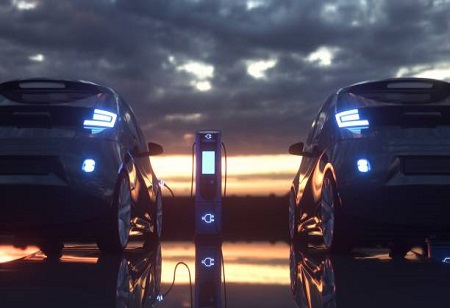
According to a report by IBEF, In May 2024, electric vehicle sales in India surged by 20.88% to 1.39 million units. In 2023, electric vehicle sales in India saw a significant increase of 49.25%, reaching 1.52 million units. Although the sector is still in its early stages, it is steadily gaining traction. This groundbreaking development is driven by the automotive sector's interest in catering to the consumer demand for innovative EVs.
In the relentless pursuit of technological advancement and mobility, the market for portable lithium-ion batteries has undergone a remarkable boom. These compact and high-performance power sources have become ubiquitous, driving innovation across industries. The factors fueling the surge in demand for portable lithium-ion batteries and the diverse applications propelling this dynamic market are seen below.
The increasing reliance on portable electronic devices has fueled an unprecedented demand for efficient and reliable power solutions. From smartphones and laptops to wearable devices and electric tools, consumers and industries alike seek compact yet powerful energy sources that can keep pace with the demands of our on-the-go lifestyles. This surge in demand has positioned lithium-ion batteries as the frontrunners in the portable power revolution.
"I really do encourage other manufacturers to bring electric cars to market. It's a good thing, and they need to bring it to market and keep iterating and improving and make better and better electric cars," Elon Musk, CEO of Tesla.
The electric vehicle industry, led by companies like Tesla, has witnessed a surge in demand for portable lithium-ion batteries. Tesla's Gigafactories, dedicated to producing these advanced batteries at scale, not only power their electric vehicles but also contribute to the development of energy storage solutions for homes and businesses.
The remarkable energy density and efficiency of lithium-ion batteries have made them the preferred choice for a wide array of applications. Technological advancements in battery chemistry, manufacturing processes, and energy management systems have further enhanced the performance and reliability of portable lithium-ion batteries. This continuous innovation has not only extended battery life but has also made them safer and more environmentally friendly.
"Innovation is key. Brands must continuously invest in research and development to bring new and technologically advanced products to the market and focus on developing cutting-edge technologies to differentiate themselves from competitors and attract consumers while deep-dive into and understanding the consumer's needs to help design the right products" Vipin Yadav, Director Marketing & HOD, Hisense India
Companies like Panasonic and LG Chem have played pivotal roles in advancing lithium-ion battery technology. Innovations such as solid-state batteries, improved cathode materials, and enhanced thermal management systems have paved the way for safer, more efficient, and longer-lasting portable power solutions.
The ubiquitous presence of smartphones, tablets, and other consumer electronics in our daily lives has been a driving force behind the surging demand for portable lithium-ion batteries. Consumers not only demand longer battery life but also expect quick and convenient charging options. This has led to an industry-wide race to develop compact, high-capacity batteries capable of meeting the power-hungry needs of modern gadgets.
"From a technology point of view, semiconductor processing technology continues to evolve to support a demand for a higher spec processor," Shinichi Murakami, Senior Manager, Equinix.
Apple's commitment to sustainability and efficiency is reflected in its pursuit of advanced portable power solutions. The integration of lithium-ion batteries in Apple devices, coupled with initiatives like the MagSafe charging system, showcases the company's dedication to providing users with powerful and convenient energy solutions.
As the world transitions towards renewable energy sources, the demand for efficient energy storage solutions has skyrocketed. Portable lithium-ion batteries play a crucial role in this transition by providing scalable and portable energy storage options. From residential solar energy systems to large-scale grid storage projects, lithium-ion batteries enable the efficient harnessing and distribution of renewable energy.
"Integrating renewable energy sources into critical infrastructure — such as electrical grids, manufacturing facilities, healthcare facilities, and transportation — is a pivotal step towards sustainability," Jimmy Yam, Vice President, Eaton.
The Hornsdale Power Reserve in South Australia, featuring Tesla's Powerpacks (lithium-ion battery packs), stands as a testament to the potential of portable batteries in green energy storage. This project, known for its rapid response capabilities and grid stabilization, highlights the pivotal role of lithium-ion batteries in renewable energy integration.
The electric mobility revolution has propelled the demand for high-performance portable batteries to unprecedented levels. Electric vehicles (EVs) rely on lithium-ion batteries for their energy storage needs, making them a cornerstone of the sustainable transportation movement. The growing adoption of electric cars, bikes, and scooters further underscores the pivotal role of portable lithium-ion batteries in shaping the future of transportation.
The success of companies like NIO in the electric vehicle market is closely tied to advancements in portable battery technology. NIO's innovative battery-swapping stations, enabled by lithium-ion technology, offer a quick and convenient solution to address the challenge of EV charging infrastructure.
"Switching To Clean Energy Sources, Digitalizing Infrastructure, Enabling Sustainable Transportation And Production Is What We Need To Do, "Matthias Rebellius, AG Managing Board Member, Siemens & CEO of Siemens Smart Infrastructure
The booming market for portable lithium-ion batteries is a testament to their pivotal role in powering the contemporary world. From consumer electronics to green energy solutions and electric transportation, these compact powerhouses have become indispensable components of our daily lives. As technological advancements continue to push the boundaries of what is possible, the trajectory of the portable lithium-ion battery market is poised for sustained growth, driving progress across diverse industries and shaping the future of energy storage and mobility.
We use cookies to ensure you get the best experience on our website. Read more...